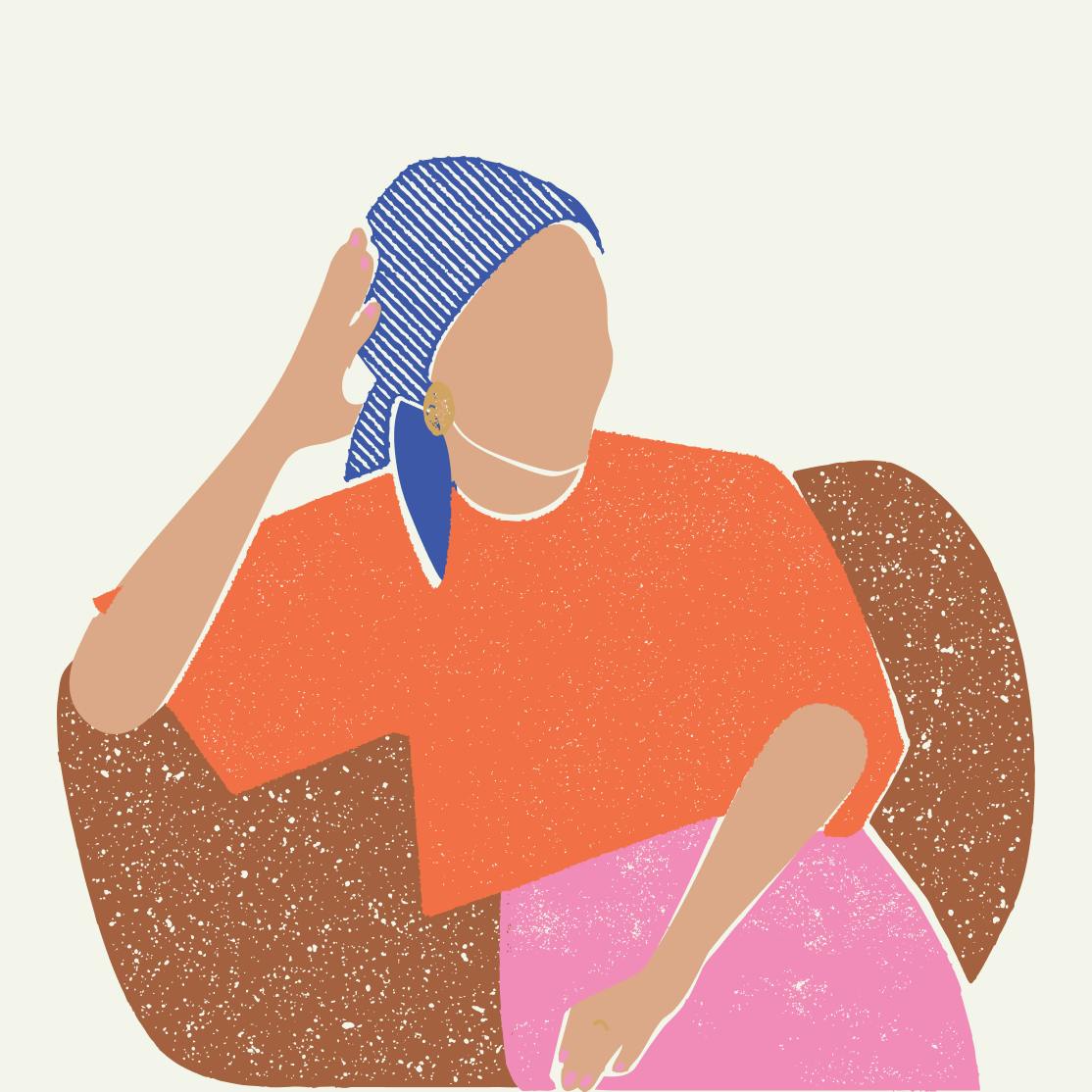Midi's Chief Clinical Officer, Dr. Mindy Goldman, who, for nearly three decades, has been a Clinical Professor in the department of OB/GYN at UCSF and the Director of the Gynecology Center for Cancer Survivors and At-Risk Women, recently held an AMA ("Ask Midi Anything") on the Midi subreddit. Here, we compiled her answers to several questions.
Keep in mind: Dr. Goldman's answers are provided for educational and informational purposes only and do not constitute medical advice. To ensure proper care for your situation, speak with a Midi clinician.
When it comes to breast cancer, it's rare to find two cases that are exactly the same. So, naturally, women who have been diagnosed with breast cancer, have a family history, or are at increased risk often have very specific questions regarding the safest ways to address menopause symptoms. In a recent AMA on Midi's subreddit, Dr. Goldman fielded questions from women looking for guidance. Here, we're sharing many of her answers:
Q: I have been on a hormone suppressant for almost 5 years. My breast cancer was feeding off my HRT. Now the oncologist says I can never be on the HRT again. Lost my sex drive and my marriage is in danger now because of this. Are there other viable options to get it back?
MG: When you are on ovarian suppression or breast therapies like tamoxifen or an aromatase inhibitor, hormone replacement therapy (HRT) should not be used. I am not sure that I would say you can never use HRT again, as the literature is always changing. If you are free of disease for a period of time and have finished all your treatment, you can discuss the risks and benefits of using hormone therapy. That being said, there are things you can do for your sex drive. The first is vaginal estrogen, which can be used safely if you have breast cancer and may help. There are no studies showing vaginal estrogen impacts survival from breast cancer. Dryness or pain will affect sex drive, so we always recommend treating the dryness and pain first. There are other drugs, called Addyi and Vyleesi, that can be used off-label for sex drive. At Midi Health, we recommend an arousal cream that may be helpful.
Q: If you know HRT isn’t an option, are you doomed? Anything we can do to help with symptoms? Anything we can take?
MG: There are always treatment options, and no one should have to suffer. Plus, there are many non-hormonal options to treat hot flashes and night sweats, as well as different supplements that can help with sleep. At Midi, we’ll discuss specifics about diet and exercise to give informed advice about fatigue. If weight gain is an issue, we have plenty of safe options to treat that, including personalized GLP-1 medications. The important thing is talking with a healthcare professional, like a Midi clinician, who can walk you through safe options for your personal symptoms.
Q: Hers-, Estrogen and Progesterone+, Oncotype 3..do I really need to be on Arimidex for 5 years? 60 years old. Previously on HRT for 10 years.
MG: This type of question is best answered by an oncologist, but I will share some things. Oncotype is used to determine whether someone gets chemotherapy or not. With a low score like that, it means you would not benefit from chemotherapy. But when someone has HR+ breast cancer (and two-thirds of breast cancer are sensitive to hormones or HR+) it means that hormonal therapies like Arimidex will be an important part of the treatment. Studies show it may even decrease risk of recurrence by as much as 50%. So the question to ask your oncologist is what they think your recurrence risk is and how much of a benefit you will get with Arimidex, then you can make informed decisions. There are also tests that are sometimes done after 5 years of these therapies that can predict the benefit of extended therapy to 10 years. Make sure to discuss all of this with your oncologist!
Q: I’m 45, having really debilitating perimenopause symptoms. My maternal grandmother had breast cancer. What are my options? Is HRT safe when you have family history?
MG: Yes, HRT is safe even with a family history of breast cancer. First, the types of HRT we use today are thought to be more “breast neutral” than older types of HRT and may not increase risk of breast cancer. But even if HRT did increase risk, it does not “add on” to the risk you have from having a family history. They are separate risks and independent. For people who have a family history, they may need more frequent or different types of screening, but they can still use hormones. With family history, we worry more when it is a first-degree relative, like a mom or sister, more so than with a grandmother, particularly if your grandmother was diagnosed at a later age. Bottom line: You can still use HRT.
Q: Triple positive breast cancer survivor here. 6 years out now and since I can't take HRT, I would sure like to find help with my symptoms. I've tried so many things but have't had a good nights sleep in 6 years.
MG: There are many things that can be offered, even if HRT isn’t recommended. The first thing is figuring out why you can’t sleep. If it’s hot flashes, there are many non-hormonal medications that can be used, and some even have sedation as a side effect. If you are getting up to pee a lot at night, there are specific medications that we can recommend. We always want to ensure that someone doesn’t have issues like sleep apnea, so sometimes a sleep study can be helpful. We ask a lot about your diet, as there are lifestyle things that can help with sleep, too. So the important thing is to speak with a healthcare professional who can do a deep dive into your specific sleep issues, so they can come up with a recommended Care Plan.
Q: My oncologist and gyn have—after me pestering them—prescribed estradiol 2x week. My libido is low and I'm gaining weight on Tamoxifen. I'm 59. Now the oncologist has agreed to consider glp1 treatment. It all feels never ending. I'm glad to be cancer free with a 3% chance of recurrence, but what can improve my life and health now?
MG: Vaginal estrogen and a personalized GLP-1 prescription are a great start. We always recommend one thing at a time so we can see what is helping and what isn’t. It can be frustrating putting all the pieces together, but it is possible to feel better! Hang in there and see how you do with the estrogen and GLP-1.
Q: I am 49, perimenopause, on HRT for a year - progesterone, estradiol gel (the lowest dose). For the past 2-3 cycles, one of my breasts has become very tender 7-12 days into the cycle. It also feels "fuller" than the other one. Should I worry and see my OBGYN asap?
MG: If the pain goes away after the 12th day of your cycle, it sounds less worrisome but any pain that is new, concerning, or persistent should get checked out. And there are things that can sometimes help with breast pain, like wearing a tight sports bra during the time in your cycle when your breasts are painful. Also certain foods can sometimes aggravate breast pain, like salt, excess sugars, and caffeine. Keeping a food diary during that time of your cycle can help you pinpoint which foods to avoid. If you think it is due to the hormones, you can try and eliminate one at a time to see if the pain goes away. For the progesterone, there are other ways of taking it besides oral so if it is due to that then you can discuss other options with your clinician.
Q: If the category of breast cancer that a survivor had was triple negative (hormone-negative), and the diagnosis was more than a dozen years ago (with no recurrence and no new BC since), is HRT a possibility for her?
MG: Yes, with hormone negative breast cancer that was years ago, HRT can be used. Although there are some oncologists who still worry, there are no studies that show the use of HRT in this situation can increase the risk of recurrence. However I know with triple-negative breast cancer, sometimes people get chemotherapy which can put them into menopause. If you have been menopausal for 10 years or more, we typically will recommend a cardiovascular evaluation to make sure that HRT is a safe option. When someone has cardiovascular disease, we may recommend other options besides HRT.
How Breast Cancer Survivors Find Relief
Many women with breast cancer, as well as survivors or those at risk of the disease, can still find relief from their menopause symptoms.
Q: What are options for pain (gluteal tendinopathy) being a breast cancer survivor, my cancer was estrogen/prog positive.
MG: Sometimes tendinopathy is acute and will go away with time. The usual types of things like alternating ice and heat may help, along with anti-inflammatory medications like ibuprofen. For this type of pain, people often need doses of ibuprofen (Advil, Motrin) of 600 mg every 6 hrs with food. If conservative measures like this don’t work, you might need to see a pain specialist to determine whether they can do some sort of injection into the area to help with the pain.
Q: ER/PR+, HER2- here! Chemo threw me into menopause and I’m on anastrazole until 2029. Please tell me there are HRT alternatives for these terrible menopause symptoms! Gabapentin doesn’t cut it!
MG: Gabapentin is only one of a number of medications. Typically, I recommend low doses of gabapentin for people who have more of their hot flashes at night, as it can cause some sedation, so low doses like 100 to 300 mg before bed are often used. There are a number of studies that have shown a benefit with different types of antidepressants, but the doses used for menopausal symptoms are often much lower than what is used to treat depression (meaning, if you had depressive symptoms, these low doses would not be sufficient). There are specific nonhormonal FDA-approved drugs—one is called Brisdelle, which is a low dose of the antidepressant Paroxetine (Paxil), lower than doses used for depression. There is an overactive bladder medication that can also help with these symptoms. There is a newer drug that was FDA-approved in 2023 called fezolinetant (Veozah) that can help. And in October 2025, another non-hormonal medication was FDA approved called Elinzanetant (Lynkuet). It often takes trial and error to see what works. But the important thing to realize is that there are many treatment options and no one should have to suffer!
Q: What are my options as a breast cancer survivor who is in menopause? Anything that we can take?
MG: A lot depends on what symptoms you have. We have lots of treatment options for hot flashes and night sweats as well as for vaginal dryness, low libido, poor sleep, and weight gain.
Q: I have chek 2 mutation. Is HRT and progesterone an option for me?
MG: When someone has a CHEK2 mutation, they need high-risk breast follow-up that includes more intensive screening, with alternating mammogram and breast MRI. Although some people may recommend avoiding HRT, we don’t have any evidence that the use of HRT would further increase your risk of breast cancer. You still need close follow-up and should be doing what you can from a lifestyle standpoint, maintaining normal body weight, getting regular-interval cardio exercise, and minimizing alcohol, but you can use HRT if desired.
Q: I had DCIS in my right breast back in 2020. I had a double mastectomy with DIEP reconstruction. Never needed to be on Tamoxifen, or chemo. I am now going through perimenopause. I’ve been using progesterone cream for the past 8 months which has helped with the symptoms. Is it safe to continue? Will it be safe to take estrogen down the road?
MG: For someone who had ductal carcinoma in situ (DCIS) only—no evidence of invasive breast cancer—and chose to get bilateral mastectomies, the risk of getting invasive breast cancer over your lifetime is only about 1% to 2%. In that situation, at Midi, we will offer you standard HRT, so yes, you could use whatever formulation of hormones that you need.
Q: My mom has had two kinds of breast cancer, the first triple negative stage 1. The second DCIS 5 years later. Is there any kind of menopause medication that's safe for her to take?
MG: It is always an individualized discussion regarding treatment options. But if someone had triple-negative disease more than 5 years ago, they are considered “cured” of that, and we typically will offer HRT. If someone had DCIS and still has breast tissue remaining (i.e., they had a lumpectomy or a unilateral mastectomy, but still have breast tissue on the other side), non-hormonal options are typically offered, but it is an individualized discussion. There is a type of HRT called Duavee, which contains an oral form of estrogen, and instead of using progesterone for uterine protection, it uses a “cousin drug” of tamoxifen, which has been shown to protect the uterine lining from uterine cancer. This type of HRT is being studied in high-risk women, including those with DCIS, to see whether it prevents breast cancer. And depending on how long ago the DCIS was, we also will do shared decision making for the standard formulations of an estrogen patch and oral progesterone. The important thing is seeing an expert who can walk her through the options.
Q: Diagnosed with HR+ BC 8 years ago at age 38. Been on Lupron and an AI since then. When I stop the Lupron and AI in two years, I'll be 48 — is it likely my period will come back or will I then just be in permanent (natural) menopause? If it does, do I have to worry about the new surge in estrogen with regard to recurrence? (But also...would the reintroduction of estrogen potentially make me feel better?!)
MG: If you got chemotherapy with your treatment, then it is less likely that your ovaries will “wake up” when you finish your treatment. But if you did not and are only on Lupron and the AI, it is very possible that you can return to your menstrual cycles, as the average age of menopause is 51 and these drugs don’t “push you into menopause” earlier. If your oncologist feels you had adequate treatment for your breast cancer and your ovaries wake up, that can help you in other ways. You will likely feel a lot better (no one really likes induced menopause), and the estrogen that your ovaries produce also can be protective for heart disease, bone health, and likely cognition, too.
Q: I'm a triple negative breast cancer survivor. 5 years post treatment and post chemo-induced menopause. BRCA-1+. My hormones and blood sugar have been messed up since the chemo/steroids. So many symptoms. Am I eligible for HRT? I've been told hormone level tests are inaccurate. Should I do them anyway to find out which are low?
MG: At Midi, we are willing to offer HRT to women with hormone-negative breast cancer who are 5 years post-treatment. There is some evidence that HRT may impact insulin sensitivity and glucose metabolism, so it is possible that it can help. But if someone has true diabetes, they will need additional types of treatments.
Q: I’m currently taking tamoxifen and experiencing a lot of menopausal symptoms. I understand that hormone replacement therapy isn’t usually recommended for people on tamoxifen, but what questions should I ask my Midi clinician to determine whether HRT might be an option for me? I’d love guidance on managing symptoms like hot flashes and sleep disruption safely.
MG: It is true that while on tamoxifen, we do not recommend using HRT, but there are many options that can help. Know that vaginal estrogen can be used even if you are on tamoxifen. In terms of systemic HRT, we always individualize. If someone has been free of disease for long periods of time and off all their treatments, we will discuss what is and isn’t known about the safety of HRT and, in some cases, will offer HRT to those who have had prior HR+ breast cancer.
Q: I had estrogen+ breast cancer. When I asked my gyn about options she suggested a progesterone IUD. My oncologist said that would be counterproductive to me getting the zoladex implant and taking anastrozole. Are there things I can do to counteract the menopause symptoms? I think I have all of the symptoms!
MG: We would not recommend a progesterone IUD when you are on Zoladex and an AI. But there are many treatment options, depending on what your symptoms are. We have treatments for hot flashes, night sweats, weight gain, sleep dysfunction, fatigue, low libido, and more. If you have vaginal dryness, vaginal estrogen can be used. The important thing is that there is no reason you need to suffer! See a specialist who can walk you through the treatment options depending on your specific symptoms.
Q: I’ve been on HRT for over a year but my dosing has only been optimized for about 6 months, since I started seeing Midi Health clinicians (Thank you, I am beyond grateful!). I am also 7 months post-menopausal. I am day 9 post op from a total hysterectomy (removed uterus, cervix, fallopian tubes and ovaries). Should I expect to experience symptoms again and need my HRT dosing adjusted?
MG: Every person is individual, so it is hard to say whether you will experience symptoms. If you were not menopausal when you started your HRT and you still had ovarian functioning, then this surgery would make you surgically menopausal, and in that case, it is possible you might need a dosage adjustment. However, if you were fully menopausal when you started your HRT, you might not notice changes. Also, for some women, just the stress and recovery of a big surgery can cause a change in symptoms where someone might need dosage adjustments. Listen to your body and go back to your Midi clinician if you do feel that your symptoms are worsening.
Q: I had breast cancer in 1988. Is that a long enough time ago to consider HRT?
MG: If your breast cancer was hormone sensitive, the standard is to offer you non-hormonal options first. However, if breast cancer were to recur it typically does much sooner. Even the early-stage cancers that recur typically do so by 15 to 20 years, and you are beyond that. So from a breast standpoint, we would be willing to have a discussion about HRT. There are other things to consider, however. If your breast cancer treatment threw you into menopause back in 1988, we would recommend a thorough cardiovascular evaluation first, as generally hormones aren’t recommended in women who have significant cardiovascular disease. The important thing is talking with an expert who can walk you through all of this.
If you’re in perimenopause or menopause and want guidance from clinicians who specialize in women’s midlife health, book a virtual visit with Midi today.
Hormonal change is at the root of dozens of symptoms women experience in the years before and after their period stops.
Our trained menopause specialists can help you connect the dots to guide you towards safe, effective solutions.
Whether you need personalized guidance or a prescription routine to tackle symptoms—including brain fog, hot flashes, sleep trouble, mood swings, and weight gain—we’ve got you covered. Learn more here.
Midi’s mission is to revolutionize healthcare for women at midlife, wherever they live and whatever their health story. We believe that starts with education, to help all of us understand our always-changing bodies and health needs. Our core values guide everything we do, including standards that ensure the quality and trustworthiness of our content and editorial processes. We’re committed to providing information that is up-to-date, accurate, and relies on evidence-based research and peer-reviewed journals. For more details on our editorial process, see here.





